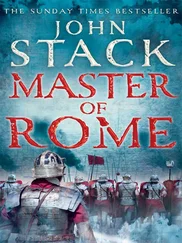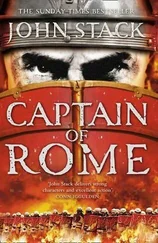‘What is our destination, Senator?’ Atticus asked as the activity intensified around him.
Duilius turned and weighed the question, determining how much the captain needed to know at this stage. The young man before him seemed competent, his position as captain of one of Rome’s military vessels a testament to his unseen abilities. He judged him to be in his early thirties, maybe a year or two younger than he was. Duilius had himself risen to the heights of his own world at that age. The man before him had done the same. If achievements mark the man, then the captain could be trusted.
The junior consul nodded towards the aft-deck and led Atticus and Longus to a quiet spot by the starboard rail.
‘I need you to sail with all possible speed in pursuit of the new fleet, Captain,’ Duilius began. ‘We have learned they are sailing into a trap set by the Carthaginians.’
‘By the gods,’ Atticus whispered, ‘what is their destination?’
‘Lipara.’
Atticus nodded, his abrupt question and the lack of further unnecessary queries justifying Duilius’s judgement of his character.
‘If you’ll excuse me, Senators, I’ll have one of my men show you to the main cabin,’ Atticus said, and left the two senators alone on the aft-deck.
He went directly to the main deck to coordinate the preparation of the ship, his heart pounding in his chest as his thoughts went to the untried and unaware fleet sailing south.
The Aquila shoved off from the Ostia docks twenty minutes later, her full complement of crew and marines on board. The two senators joined Septimus and Atticus on the aft-deck as the galley cleared the busy inner harbour under oar power. Directly ahead the sun was setting rapidly, its golden light causing all to shield their eyes against the glare. Gaius kept both hands steady on the tiller, his eyesight seemingly unaffected as he nimbly wove the galley through the obstacle course of the Republic’s busiest port.
As the Aquila reached the mouth of the harbour, the protective headland to the north slipped behind them, exposing their beam to the full force of the northerly wind. Atticus called for the oars to be shipped and the mainsail raised as Gaius adjusted his course southwards. The orders were carried out with alacrity, and Duilius noted the efficiency, wondering why Scipio had not taken such an obviously competent crew on his voyage south. The Aquila shot ahead under full sail, making twelve knots as her spear-like bow cut through the white horses of the wave tips.
Atticus noted the intense stare of Duilius as he looked ahead to the darkening horizon. Lipara was no more than thirty-six hours to the south. Scipio’s considerable head start was now weighed against the experienced crew of the Aquila. The galleys themselves were evenly matched, the Aquila ’s design copied in every hull of the Classis Romanus. Only the crews were different, with men new to their galleys set against men such as Gaius and Lucius, who’d spent countless hours minutely adjusting the trim of the Aquila to garner every knot of speed from the wind.
Atticus found himself matching the intense stare of the senator as he looked to the horizon ahead. He remained silent, knowing there would be plenty of time to question the consul on what was known of the trap. Right now those questions took second place to the immediate need to ensure that his galley was running at her top speed. Within fifteen minutes the water around them was shrouded in darkness, the night’s arrival seemingly portentous, the obscure seascape suppressing the hope of the men standing on the aft-deck of the Aquila.
CHAPTER TWELVE
From the main cabin in the Mars , Scipio clearly heard the call of land sighted on the port quarter. He consulted the maps laid out before him, his finger running down the line of the ship’s course as described by the captain the day before. Fulfidias had estimated that the Mars would sight the volcanic island of Stromboli at the beginning of the third day and now, an hour after dawn, the ship was indeed sailing past the island.
Scipio noticed the sulphuric stench infusing the air in the cabin and he went on deck to see the famed island that he had never laid eyes on before. The legendary volcano rose over three thousand feet above the sea, its summit constantly spewing out noxious smoke that seemed to fill the entire eastern sky off the port bow.
Scipio approached Fulfidias.
‘Report, Captain.’
‘We are an hour short of Lipara, Consul. Our next land sighting will be Euonymos, and immediately after that we will be able to see the island of Lipara.’
Scipio nodded. ‘Call me when we pass Euonymos,’ he said, and returned to his cabin.
‘Land ahead, three degrees off the port bow!’
Atticus glanced up at the masthead lookout and followed his pointed hand to the low cloud ahead on the eastern horizon.
Stromboli.
He rubbed his tired eyes with his thumb and forefinger, the morning sun seemingly brighter than usual after the darkness of the pre-dawn.
‘Anything?’ a voice beside him enquired.
Atticus turned to see Duilius standing beside him, the consul’s bloodshot eyes testament to the sleepless night shared by all on board the Aquila.
Atticus shook his head before returning his full concentration to the horizon ahead.
Fifteen minutes later the Aquila was parallel to Stromboli, the half-mile-high volcano hiding the morning sun and casting a three-mile-long shadow across the sea through which the galley sailed at speed.
‘An hour from Lipara,’ Atticus thought.
‘Lucius, what’s our speed?’
The second-in-command signalled the drop of the marker on the foredeck and counted aloud until it passed his position on the aft-deck, one hundred and twenty feet from the start point. He closed his eyes momentarily to calculate.
‘A shade over ten knots, Captain.’
‘Orders to below, engage oars at attack speed. Once rhythm has been established, accelerate to ramming speed.’
‘Yes, Captain,’ Lucius replied and went below to the slave deck.
From the aft-deck, Atticus clearly heard the drum master call the slaves to order, making them ready to engage. It was a tricky manoeuvre, one only an experienced crew of oarsmen could accomplish. At attack speed their stroke was eleven knots, one faster than the wind. Their first stroke would have to be perfect, with each oar hitting the water simultaneously, otherwise the current of water flowing past the ship would foul any oar out of sequence. There was no margin for error. Atticus waited for the order to engage to be given, holding his breath until the drum beat started. The order to engage was coupled with the first beat and two hundred oars hit the water as one. The Aquila took on the extra knot of speed with ease. Within a minute the order for ramming speed was given and the Aquila reached her top speed of thirteen knots.
‘How long can your slaves maintain this speed?’ Duilius asked, watching the manoeuvre intently.
‘Five minutes under normal circumstances,’ Atticus began. ‘However, with the wind taking the lion’s share of ten knots, the rowers only have to make up the additional three. The tempo is as high as ramming speed but the effort is greatly reduced.’
Again Duilius nodded, his face reflecting his admiration and understanding of the skill required for such an operation.
Atticus noted the unspoken compliment. In the brief time he had known Duilius, he had begun to form a very different opinion of senators from the one Scipio had ingrained in him.
The Aquila sailed past the island of Euonymos at thirteen knots, her every stroke taking her closer to Lipara. Atticus stood with Septimus and Duilius on the foredeck, the three men searching the sea ahead in silence. Atticus was tempted to increase the oar-stroke to beyond ramming speed, a move made possible given the trailing wind. It was a highly dangerous manoeuvre, though, one he had seen carried out only once before – and that with disastrous consequences. Above ramming speed the individual beats on the drum began to merge and the guiding rhythm, so important in keeping two hundred men working in unison, could be easily lost. Atticus dismissed the idea with reluctance. He would have to rely on their current speed and pray to Fortuna that they would be in time.
Читать дальше
Конец ознакомительного отрывка
Купить книгу











